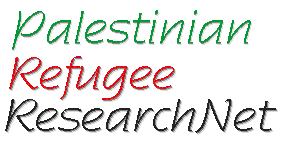A Stocktaking Conference on Palestinian Refugee Research
13h30-15h00
Tuesday, 9 December 1997Discussion Session: Interim Measures
What sort of interim measures ought to be adopted to deal with the Palestinian refugee problem? What are the challenges, opportunities, constraints of the current phase?
The nature of the interim period
At the outset, it was noted that the interim period was problematic in several essential respects. First, it was period when final status arrangements for the refugees had not yet been agreed to, and when it was therefore essential that initiatives undertaken to meet their social and economic needs not in any way prejudice their long-term political rights. Second, the interim period was one characterized by substantial change. In the West Bank and Gaza, the coming to power of the Palestinian Authority and the (re)creation of the PLO Department of Refugee Affairs create a new situation in which institutional linkages have become more complex. Another indication of the changing environment is the establishment of the PA's new Higher Committee for Refugees. Finally, the interim period is characterized by substantial uncertainty and indeterminacy, making program planning even more difficult.
Refugees in the West Bank and Gaza
Several issues emerged with respect to the situation of refugees in the West Bank/Gaza. Participants focused on the institutional relations between the various donor agencies and Palestinian representatives, on the needs of refugees at this stage, and on the obstacles impeding the planning and effective delivery of assistance to the Palestinian refugees.
Donor efforts are sometimes cast in a negative light and perceived as a means of normalizing the issue of refugees. This is especially sensitive in the interim period when camp dwellers want improved provisional services yet they are concerned about maintaining the social landscape of the camps lest their "provisional" refugee status be put into question. One participant asserted that refugees were thus merely trying to protect themselves in the political negotiations. However, participants underlined that the needs of the refugee and non-refugee populations of the West Bank/Gaza were quite similar. Existing tensions between the two groups could be heightened and present a political risk. The conclusion was that status-centered assistance ought not to be confused with the protection of rights.
Institutional relations are also significantly more complex in this period. Whereas UNRWA used to be the primary agency responsible for coordinating donor efforts, the establishment and involvement of other agencies (UNSCO and UNDP) in the process created a situation where donor competition has brought to the fore the need to devise a more disciplined structure for coordination. It was suggested by one speaker that the demarcation of the Palestinian refugee issue as a sectoral working group (SWG) within the current Local Aid Coordination Committee framework could be of assistance in the matter. However, this raised concerns among others about the kind of tensions that such distinctions may trigger within the Palestinian community.
More specific concerns were raised about the nature of the international assistance to the refugee population. One participant criticized the current focus on specific projects rather than more funding to maintain UNRWA's core programs. One consequence of this focus in the area of education has been to increase the quality gap between UNRWA-provided education and public education in the West Bank and Gaza. Another speaker expressed doubt as to the existence of a clear plan of purpose and desired outcome of development shared by all the donor agencies.
Refugees in the diaspora
Discussion of interim measures in the diaspora focussed on Lebanon, an area that all participants identified as being of the most pressing need. In the case of Lebanon, the political context was identified as one of the main differences influencing the challenges and constraints of the interim period. Sensitivities to the Palestinian refugee issue in the country raise the dual question about the nature and appropriate mechanisms for the delivery of assistance to this population. Participants agreed on the fact that the only point of agreement between the Lebanese and Palestinian representatives is the consensus on the interim nature of the period. As a consequence, one speaker suggested that the funding of UNRWA ought to be channelled heavily toward the Palestinian refugee population of Lebanon.
Factors in effective programming
A final discussion revolved around the recognition that effective developmental assistance requires the participation of beneficiaries. One participant underlined the need for participation rather than mere consultation. Another highlighted the importance of close consultation with the host governments and the acceptance of the legitimacy of the views expounded by their representatives. However, two obstacles were identified in this respect: the labor-intensive nature of such consultative processes and the burdens that they impose on the limited resources and staff of donor agencies; and the need to create new kinds of partnerships that include old and new actors. Though this approach was favoured by the Refugee Working Group, the fact remains that donor nations are also constrained by the political conditions in the field as well as by domestic political considerations.
The PRRN/IDRC compensation workshop was funded by IDRC and the Canadian International Development Agency thrrough the Expert and Advisory Services Fund. PRRN is a project of the Interuniversity Consortium for Arab Studies (Montréal).Last modified 15/12/97. Rex Brynen/info@prrn.org


